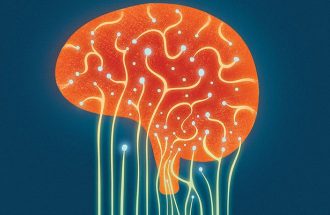Contributing writer for Wake Up World
Beneficial gut bacteria are the latest darlings of neurological health as researchers continue to uncover new and fascinating roles they play in our level of happiness, serenity and emotional well-being. Incredibly, a lack of specific types of gut bacteria (or excess of harmful microbes) are associated with autism, irritable bowel and chronic fatigue syndrome, along with a range of mood disorders — including anxiety, depression and poor response to stress. These microorganisms are so powerful that if they become imbalanced in the gut, it can mean the difference between living a joyful life or one where we can barely drag ourselves out of bed.
On top of that, cutting edge research just released by Northeastern University in Boston discovered a species of gut bacteria that “eat” brain chemicals — in this case gamma-aminobutyric acid, or GABA. What has scientists excited about the finding is the results of the study add to a growing body of evidence that show gut bacteria profoundly effect our brain and mental health.
[pro_ad_display_adzone id=”110028″]
How GABA Works
When normal levels of GABA are present in the brain, you feel calm, at ease and sleep well. On the opposite end — when you don’t have enough of this important neurotransmitter — stress, anxiety, nervousness, irritability and insomnia take over. You can also struggle with panic disorders, depression, epilepsy, Tourette’s syndrome, hypertension, dry skin and emotional issues associated with PMS. What’s more, inadequate levels result in poor digestion, bloating, flatulence and malabsorption since GABA stimulates secretion of digestive enzymes.
One way GABA reduces stress and other health complaints is by preventing nerve impulses linked with anxiety from reaching the motor centers of the brain. It also decreases beta brainwaves, while increasing alpha brainwaves. The first are associated with concentration, attention and alertness, but become imbalanced during periods of stress, which can lead to anxiety, insomnia and depression. In contrast, alpha brainwaves are produced when we’re engaged in meditative activities like yoga, t’ai chi, focusing on one task at a time, falling asleep and, yes, during meditation.
GABA is manufactured in the body by converting L-glutamine into glutamic acid or glutamate. Next, the enzyme glutamate decarboxylase steps in and converts glutamate to GABA. But for this enzyme to do its job properly, it needs the active form of Vitamin B6 — Pyridoxal-5-Phosphate (P5P). Zinc and the amino acid taurine also support the process.
Nutrients that increase GABA levels:
L-theanine — A plant-based amino acid found abundantly in green tea which encourages alpha brainwaves and strengthens response in GABA receptors.
Inositol — Part of the B-vitamin group, it can help reduce anxiety and depression by enhancing the ability of GABA to attatch to benzodiazepine receptors.
Magnesium — An important mineral that is severely lacking in modern western diets. It’s estimated that up to 80% of women, and 70% of men, have a magnesium deficiency — which is associated with anxiety, panic disorders, apathy, poor attention span, depression, insomnia, irritability and nervousness. When magnesium levels are adequate, the mineral activates GABA receptors.
Noni fruit — Native to French Polynesia — and traditionally used to ease nervous disorders — the fruit helps to calm anxiety by binding to GABA receptors in the brain.
Chamomile — Known to balance moods, this medicinal herb has sedative properties due to the flavonoid apigenin, which attaches to benzodiazepine and GABA receptors.
Other helpful herbs include valerian, kava, ginkgo biloba, passionflower, skullcap, hops, lemon balm and magnolia bark. Moreover, cultured and fermented foods — like yogurt and sauerkraut — naturally contain GABA. The same for fava beans, reishi mushrooms, sunflower seeds and tomatoes.
GABA, Gut Microbiome and Mental Health
“Although research on microbial communities related to psychiatric disorders may never lead to a cure, it could have astonishing relevance to improving patients’ quality of life.” ~Domenico Simone of George Washington University in Ashburn, Virginia.
A 2011 study showed the gut bacteria Lactobacillus rhamnosus significantly altered GABA activity for the better in the brains of test animals, and also improved their stress response. A subsequent study found the effects vanished when they severed the vagus nerve — a “superhighway” of sorts that connects the gut to the brain — leading the team to conclude there is a strong correlation between the “gut-brain axis” and emotional health.
And now scientists at Northeastern University discovered a specific bacteria in the gut (called Bacteroides fragilis KLE1758) that actually consumes GABA. “Nothing made it grow, except GABA,” said researcher Philip Strandwitz last month. The next step is to seek out other types of gut bacteria that eat or even produce GABA. He plans to study their effect on the behavior and brains of lab animals. There’s hope such research will eventually help create effective treatments for disorders like anxiety and depression.
Article sources
- http://www.pnas.org/content/108/38/16050
- http://www.abstractsonline.com/pp8/#!/4060/presentation/18619
- https://www.newscientist.com/article/2095769-gut-bacteria-spotted-eating-brain-chemicals-for-the-first-time/
- http://mediarelations.cornell.edu/2016/06/27/3770/
- http://blogs.discovermagazine.com/notrocketscience/2011/08/29/from-guts-to-brains-eating-probiotic-bacteria-changes-behaviour-in-mice/#.V6IC0FdBJos
- http://www.vitalityandwellness.com.au/health-blog/low-gaba-levels-increase-gaba-naturally
About the author:
 Carolanne Wright enthusiastically believes if we want to see change in the world, we need to be the change. As a nutritionist, natural foods chef and wellness coach, Carolanne has encouraged others to embrace a healthy lifestyle of organic living, gratefulness and joyful orientation for over 13 years.
Carolanne Wright enthusiastically believes if we want to see change in the world, we need to be the change. As a nutritionist, natural foods chef and wellness coach, Carolanne has encouraged others to embrace a healthy lifestyle of organic living, gratefulness and joyful orientation for over 13 years.
Through her website Thrive-Living.net, she looks forward to connecting with other like-minded people from around the world who share a similar vision. You can also follow Carolanne on Facebook, Twitter and Pinterest.
Further reading from Carolanne Wright:
- The Most Eco-Friendly Nation on the Planet is Now Carbon Negative
- Plastic Waste in the Ocean Will Outnumber Fish by 2050
- Mind Control, Subliminal Messages and the Brainwashing of America
- Monsanto Charged with Crimes Against Nature and Humanity – Set to Stand Trial in 2016
- Plastic-Eating Mushroom Discovered in the Amazon Rainforest — A Solution for Our Trash Saturated World?
- Over 100 Scientific Studies Agree: Cannabis Annihilates Cancer
- Why Every Parent Should Consider Unschooling
- First U.S. City Produces More Electricity Than It Uses — With 100% Renewable Technology
- If You Care About Animals and the Earth, Here’s Why You Need to Boycott Palm Oil Immediately
- Basic Income Guarantee: A Surprisingly Cost-Effective Method for Eliminating Poverty
[pro_ad_display_adzone id=”110027″]







